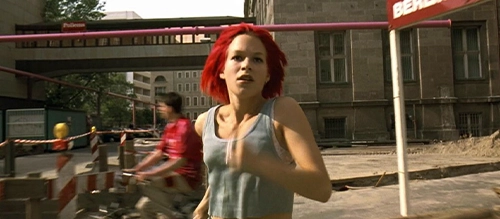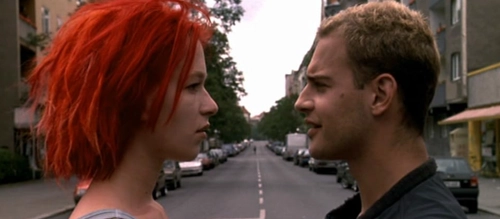Run Lola Run (1998) Review

Run Lola Run (1998)
Director: Tom Tykwer
Screenwriter: Tom Tykwer
Starring: Franke Potente, Moritz Bleibtreu, Herbert Knaup, Armin Rohde, Nina Petri
It begins with a bundled deal, a bag left on the U-Bahn, a phone call. Lola (Franke Potente) and Manni (Moritz Bleibtreu) are in trouble. Lola (Franke Potente) has twenty minutes to find 100,000 Deutschmarks otherwise Manni (Moritz Bleibtreu) is going to have to pay a much higher price.
Lola’s first thought is her father (Herbert Knaup). She runs. As she speeds by, we see glimpses of the futures of everyone she encounters in rapid fire polaroids. She narrowly misses being hit by a car, that instead crashes into another vehicle. Is that important?
The meeting with her dad does not go well. She runs. Twenty minutes just isn’t enough time. Manni makes a decision. The wrong one. Lola is shot.
Well, we all have our bad days.
It’s such an unsatisfactory story. Which is fine, because we’re going to do it all over again.
What if the next time round she was slower? Faster? Avoided that car altogether? Didn’t catch her father in a compromising situation?
Lola’s twenty minutes start over, her actions this time altering slightly. The consequences changing dramatically. Even those snapshot futures of those around her change as their reactions differ to the flame-haired woman on her very important quest.
It’s Sliding Doors (1998). But good.
Run Lola Run wasn’t German director Tom Tykwer’s first feature-length film, but it was the film that shot him to international fame and acclaim. And it remains one of the films he is best known for – which is no mean feat given that since 1998 he has been involved in much bigger projects such as Perfume: Story of a Murderer (2006), The International (2009), and Cloud Atlas (2012).
In the time of DVDs, before widespread streaming, the UK would have had a somewhat warped view of what foreign cinema was, only seeing what the industry decided could sell. These were often artistic masterpieces, worthy, and poetic. Think La Dolce Vita (1960), Cinema Paradiso (1988), The Three Colours Trilogy (1993-1994). Audiences could be forgiven for believing world cinema was highbrow and only for true film buffs. Run Lola Run is an important addition to the number of foreign films that helped combat that notion. Completely accessible and thoroughly enjoyable, it has everything you’d want from an action film: high stakes, violence, tension, and jeopardy. The soundtrack, largely constructed with compositions Tom Tykwer worked on himself, adds to this and is the perfect pulse, Lola’s feet seeming to hit the ground to the same rhythm as the electronic beat.

While it is shot, paced, and scripted (slightly unimaginably) like a bog-standard action film, there is a slight supernatural element. Lola’s scream puts a banshee to shame, her force of will seems to be able to bend the laws of nature, and there’s a blind lady who senses Manni’s needs. Lola’s ability to remember snippets and learn from the earlier incarnations of this crucial twenty minutes is the biggest clue that reality isn’t quite what it seems.
This thread of the metaphysical weaving throughout the three narratives skews reality just enough to discombobulate. Tykwer never makes it clear which one of the three outcomes is true, if any of them are. Perhaps the second two are a dying Lola’s brain trying to see if anything could have been different, desperately searching for a happy ending, but it doesn’t matter.
Some things in Tykwer’s universe seem inevitable – death, car crashes, being out of breath – when others can be changed and controlled by his characters. Run Lola Run is a film all about consequence, chance, and what ifs. It explores the notion that even seemingly inconsequential moments can have the profoundest effect on life, whether that’s sidestepping to avoid a dog, running downstairs, or falling.
If you are someone who needs their stories fully explained and tied up with a bow in order to feel satisfied, then Run Lola Run possibly isn’t for you, but if you like your thrillers served with a side of determinism vs fatalism then this is definitely one to consider.
Score: 20/24

